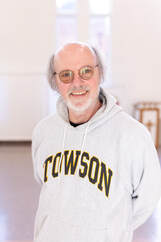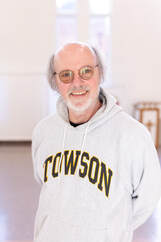 In this visioning journey on which we've set sail, I volunteered to serve on the committee that writes a state-of-the-church narrative. Producing the narrative was one of the five recommendations in the Report on Congregational Health that a consultation generated last summer. So when the five committees gather regularly around five tables in the Fellowship Hall to talk and plan, I sit at my table alone with enough pens and paper and markers for a whole team. Theresa Mathis moves among the tables, guiding and encouraging. Keeping tabs. When she gets to mine, she asks the same question she's posed to all the others, “Well, Bob, how's the conversation going here?” We laugh. “Fascinating,” I say. I guess I'm the only one who enjoys researching the past to write about the present. Chasing after the future must suit everyone else far better. You can read the report when I'm done. It's six single-spaced pages so far. And growing. I'm sure it will be fascinating. So here are a few early fascinating observations. Back in 2005, there was another consultation. Maybe you remember. Average church attendance was 212 back then, and Sunday School was at 90 percent capacity for all ages. And yet, we lamented our present. “Where are the old days when we were better?” The church in decline needed help, a new direction. The consultation talked about repairing the organ, building ramps, fixing lights, shortening pews, widening spaces, adding signs, changing here and there, inventing this and that. Since it seems I'm stuck on the word fascinating, I find it fascinating that 17 years later, in 2022, with daily church attendance far below 100 and Sunday School on life support, the laments of our latest consultation are essential the same as before. And again we are changing and inventing. Father Richard Rohr, founder of the Center for Action and Contemplation, wrote in a recent daily meditation about German scholar Heinrich Zimmer (1890–1943), who studied sacred images and their relationship to spirituality. Zimmer concluded, “The best things can’t be told: the second-best are misunderstood.” So we settle for easy talk about the “third-best things” – things like lamenting attendance and counting money and fixing things and changing here and there. It's a conversation that generates a reassuring sense of our own authority and a “sense of certitude, order and control.” We ask third-best questions that require only third-best answers. Action questions. Action answers. Those questions are necessary for forecasting and rebuilding structures and programs. But if they're all we ask, then our inquiries reveal a very common degree of spiritual poverty, Father Rohr says. There are also richer questions to ask. And richer answers to contemplate. Admission of that poverty, Father Rohr writes, “should keep us humble, curious, and searching for God. I offer that as hard-won wisdom.” So, maybe while Jamie's here, he can help redirect someone like me, who spends hours and days fascinated about answering third-best questions, to admit his spiritual poverty. Maybe he can point the way to second-best things that point to first-best things. Maybe he can clear up misunderstandings. Maybe he can lead a new, richer and deeper, spiritual consultation. Maybe we'll learn both to work and to wonder. Maybe someone else will join my table. Watch for my report soon. Bob Kendall
0 Comments
 Spending most of my summer and fall after graduating from N.C. Wesleyan College in 1970 at Fort Polk, Louisiana, was not part of my plans. I'd studied four years to be a biologist. Now Army basic training and advanced individual training were to be my new courses. I'd graduate again in November, this time in uniform with a rank and a military occupational specialty. Infantry. Basic training, in addition to fundamental military skills, taught the men in my training company, Alpha One One, a new way of thinking. During nine hot weeks, we set aside the old, sometimes not very willingly, and absorbed Army new. One July afternoon, during hand-to-hand combat training in the sawdust pit, I had a nose-tonose conversation with Drill Sergeant Reno, who didn't care for my morning shave. I was only 22, and I didn't shave every day yet – there were no whiskers. Only a little fuzz. Like a tender peach. “Your face isn't up to standard, trainee! Do you understand me?” “Yes, Drill Sergeant!” From then on, I took the razor every morning, and I shaved my face naked. That six-month journey was the transition from civilian to soldier. From old to new. From fuzz to whiskers. Drill Sergeant Reno made his point loudly, and I learned a valuable lesson – just let change happen. Accept it. It wasn't easy. This next period of time at First Christian Church is only weeks old and could stretch months and months and months. Maybe beyond. For me, it will be a kind of spiritual basic training – a time to set aside the old, to await actively what will be new. What I recall fondly about my church and hope to be true once more, what I didn't care for and want no part of again, what I wish to be fresh in the future belong to me alone. They're old baggage, really. And they will get in my way. They will interfere with my waiting. I took thoughts like those about my own young life to Louisiana more than 50 years ago. And I left them there. And I came home new. And far better. Almost seven years ago, Gary preached a sermon titled “Leader of the Band.” It's one of the fabulous dozen in kernels from a farmer's pulpit. He wrote and spoke: “What if he means to say that it is so easy to make our accommodation with the existing order that we stop raising our eyes to the horizon and believing in something better … something more holy? How, after all, shall we prepare the way of the Lord if our lives are filled with everything else? How can we open ourselves to new ways of thinking and acting and seeing the world until we clear some room? And yes, it may feel like trauma … upheaval … something crashing down. But the surest way to avoid the new is to hold fast to the old.” We've published our call for new leadership and a new tomorrow. It's time to let change happen. It's time to clear some room. It's time to look to the horizon. It's time to wait for something new because new is coming … if only we will let it. Old is already here. Let it go. I have it on good authority. Drill Sergeant Reno said so. Bob Kendall |
Authors
These thoughts and reflections come from our Senior Minister, Minister of Music and Board Chair. We hope that they provide both challenge and inspiration for your spiritual life. Archives
July 2024
Categories
All
|
#FCCWILSONNC
A Disciples of Christ Congregation located in Eastern North Carolina
207 Tarboro Street North | Wilson, NC
Corner of Vance & Tarboro Streets
252-237-4125
Updated: July 17, 2024 | 9:45am
A Disciples of Christ Congregation located in Eastern North Carolina
207 Tarboro Street North | Wilson, NC
Corner of Vance & Tarboro Streets
252-237-4125
Updated: July 17, 2024 | 9:45am
Proudly powered by Weebly


 RSS Feed
RSS Feed
